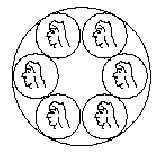POJ 2484 A Funny Game(智商博弈)
阿新 • • 發佈:2018-02-23
src search 證明 ear 奇數 mem output pos 博弈

Figure 1
Note: For n > 3, we use c1, c2, ..., cn to denote the coins clockwise and if Alice remove c2, then c1 and c3 are NOT adjacent! (Because there is an empty place between c1 and c3.)
Suppose that both Alice and Bob do their best in the game.
You are to write a program to determine who will finally win the game.
| Time Limit: 1000MS | Memory Limit: 65536K | |
| Total Submissions: 6397 | Accepted: 3978 |
Description
Alice and Bob decide to play a funny game. At the beginning of the game they pick n(1 <= n <= 106) coins in a circle, as Figure 1 shows. A move consists in removing one or two adjacent coins, leaving all other coins untouched. At least one coin must be removed. Players alternate moves with Alice starting. The player that removes the last coin wins. (The last player to move wins. If you can‘t move, you lose.)
Figure 1
Note: For n > 3, we use c1, c2, ..., cn to denote the coins clockwise and if Alice remove c2, then c1 and c3 are NOT adjacent! (Because there is an empty place between c1 and c3.)
Suppose that both Alice and Bob do their best in the game.
You are to write a program to determine who will finally win the game.
Input
Output
For each test case, if Alice win the game,output "Alice", otherwise output "Bob".Sample Input
1 2 3 0
Sample Output
Alice Alice Bob
Source
POJ Contest,Author:Mathematica@ZSU 比自己想象中的easy 1e9倍啊233 感覺這東西沒法求SG,那麽一定是個玄學題 事實證明自己還是太菜了 結論:當n==2或n==1是先手勝,否則後手勝 證明: 當$n$為偶數時,不論先手怎麽走,後手總會根據中心對稱模仿先手走 當$n$為奇數時,不論先手怎麽走,後手總會進行與之相反的操作來構造成第一種情況#include<cstdio> int main() { int T_T; while( scanf("%d",&T_T) && T_T ) T_T>2?printf("Bob\n"):printf("Alice\n"); return 0; }
POJ 2484 A Funny Game(智商博弈)
